- Home
- Wendell Berry
The Selected Poems of Wendell Berry Page 2
The Selected Poems of Wendell Berry Read online
Page 2
She could see, she would see all her life, her brother Galen on the bay gelding known as Rex, starting to a place near Smallwood where a company of Confederate volunteers was known to be gathering. He was senior to Rebecca by eleven years and therefore, to her, a mature man. But in her vision of him, as she grew older, he became younger, until the day when, in her never-finished sorrow, the realization would come: “He was just a boy!”
He sat well on his horse. He rode alone and—as she saw, as in her vision she increasingly understood—his face had a certain solemnity as if, the hesitance and effort of his decision now behind him, he felt himself a man fated to war—though not, surely, a man fated to be killed in that moment, before he could breathe again.
The family knew who did it, though there was no witness, no avowal, no evidence that was indisputable. And so the story she knew was not the story only of her brother, but in her vision he was alone, and when she heard the shot it surprised her. Every time the vision returned to her in the night or in the daytime when she sat alone the shot surprised her—for she saw each time that Galen anticipated nothing, was aware perhaps of nothing but himself and his horse passing on their way. It seemed to her that Galen did not hear the shot. He fell at once and cleanly from the saddle, delivered out of time without even a suspicion of the cause. The ones who happened upon his body found the horse nearby, grazing along the roadside.
The second vision was from the fall of 1863, more than two years after the first. Several slaves, five or six of them, both men and women, were cutting and shocking corn by moonlight out on the Bird’s Branch Road, not far from the church. In her vision she saw them plainly, working steadily along to the rhythm that their corn knives hacked into the rustling of the dry corn. They were singing. They were singing, “Freedom! Oh, freedom!” That was all the song, but they sang it back and forth among themselves. Sometimes they would fall silent, and then the song continued unsung to the beat of the knives. And then a solitary voice would lift into the moonlight, “Oh, freedom!” and then they would all sing, “Freedom! Oh, freedom!” a cry that was old and creaturely and human. Later she would imagine that there had rarely been a time, and in Port William after slavery perhaps never again a time, when the word “freedom” had been so understandingly sounded. As the singers sang, they worked. As they worked, the rows of standing corn slowly became fewer and the rows of shocks increased. Over the striking of the knives and the steady rustling of the corn and the singing, the moonlight fell as if a greater silence were thus made visible.
And Rebecca saw too, following the narrow road up the rise from the church, another of the little bands of hostile men that in those years crisscrossed the neighborhood, leaving it each time, it seemed to her, worse than it had been before, just as they crisscrossed also her own mind, leaving it each time sadder and yet stronger and less to be fooled.
There was no question who these were, for the people of Port William had come by various ways to know for certain. These were Confederate cavalry, six men and an officer. Their presence was perhaps accountable by some minor event or accident of the war, and yet, to her own mind, it was factual without being explainable. They simply were there, alien and unbelonging, as they had been wherever they had come from, as they would be wherever they would go, like all the others who had been displaced by the unaiming destiny of the bunch.
As they came up along the corn rows and into the sound of the Negroes’ singing and understood it, that word rising as if by nature out of bondage, the officer abruptly spurred his horse, put him to the rock fence beside the road, and neatly cleared it. He rode in among the crew of workers—they were scattering, running like quail into the standing corn. Drawing his pistol, he shot the eldest of them, a slave man named Tucker, point-blank in the side of the head.
It was no wonder that her time to marry came late for a young woman of Port William. It came when she was twenty-four, seven years after the formal, the “historical,” ending of the war. The nighttime reprisals of vengeful men—the unofficial violence set loose and still nominally justified by official violence—were still terrorizing the country. Her own repugnance and disdain persisted in those years of official peace. She would not be wedded, she could hardly bear to be looked at, by the young men of her own place, every one of whom seemed to her to bear the taint of what she called ever after “that awfulness.” She married instead an Irish immigrant who, to escape the bunch-violence that ruled his own land, had come to America and, hearing that a “shoe cobbler” was needed, finally to Port William.
Though she was old enough in that summer of 1864 for a Port William girl to be married, the awfulness already had driven any thought of courtship or marriage from her mind. She had instead taken a defensive stand on the side merely of the helpless and the threatened. On their behalf she distrusted all the creatures of the bunches and the weapons. That was why she sat still in her fear and watched as the alien riders, in the absence or invisibility of the entire membership of the town, occupied and ruled over the empty road.
And then, seeing nothing easily to be taken or enjoyed, they began to give the place up. They gathered again in the road and formed raggedly a line, resuming the direction that would carry them on through the town and finally into the river valley.
Looking away then in the direction they were going to go, she saw hanging over the river a single small white cloud just touched by the gold of the weakening sun. And then she saw, as if wonder must now be added to the new normality of outrage, the figure of a walking man emerge into the open concavity of the road as it came up out of the valley and turned toward the town. She knew immediately who it was, as she might have recognized at a distance too far for reading the character of her own script. It was Eli, her mother’s slave, with a split basket on his arm, bringing to her and Dicey, she supposed, some gift of food. Alone, old and ambling, visible against the bare horizon as the chimney of a burned house, he would be at the mercy of the riders, who had not yet seen him, though they would see him as soon as they looked. They would surround him on their horses. They would point their guns at him for the pleasure of seeing him frightened. They would demand the basket. Or worse. They could do worse. They could do as they pleased.
In her mind a thought like a prayer cried out: “Eli! Get out of sight!”
She looked quickly at the line of riders now coming up even with her window, and then quickly back at Eli. For another wonder, he had seen them first. Exactly as if he had heard her unspoken warning, he had vanished.
Relieved, she now looked only at the line of riders as one by one they straggled by. Their horses were fairly fit and of fairly good stock. The men in general rode them well enough, with an evident sense of their power, even maybe of pomp, and yet still she felt their strangeness, the strangeness of their ability now, in their bunch, to do as they pleased. They were like biting dogs. Emboldened by the fear they had caused, they longed for pursuit, but they had found as yet nobody to pursue.
They had almost gone by. She had almost relaxed her strict vigilance over her fear—her courage, though she had not called it so, that had kept her sitting and watching. She was ready to stand up, shake herself, and go to find Dicey and the children, when the last of the line of riders glanced up and saw her.
He stopped his horse, turned him to face the house, and sat looking up at her. Having recovered her stillness, pressing firmly downward within herself the physical tremor of her fright, she looked back at him. He was a young man with a curly, sand-colored beard. To somebody else, or in different circumstances, he might have seemed even, in his fashion, a handsome young man. But she feared him and she hated him, and without flinching she looked back at him.
She thought, and the thought was familiar to her, how easy it would have been, if she had had a gun, if she had placed herself a few feet back in the shadowy room, to have shot him dead. And then she thought immediately, for this thought also was familiar, of the endlessness of such an act, or of its many ends mu
ltiplying unforeseeably forever. Maybe it was that thought that kept most people out of the way of such acts, when they could keep out of the way of them.
She knew she was daring him. She meant her facing him, her looking back, to be merely a refusal to be cowed by him. But she knew, she felt, the boldness even of so quiet a refusal. The deliberate impassivity of her face he would see as impudent. He would be challenged by it. He could, if he wished, shoot her and get clean away, unwitnessed, his shot not necessarily causing his companions even to look back.
His reprisal, though not violent, though it did not cause her to move or change expression, was nonetheless shocking to her, for it was just as unexpected as she expected it to be. He said without raising his voice, in perfect contempt, “Get your ugly face out of that window.”
Though for some time she continued to watch him, defying him, for she trembled now with the knowledge that she gladly would have killed him, he went on and did not look back.
Finally she allowed herself to look away. She willed herself free of her anger and her fear. She allowed the familiar room and all the house, quiet and warm and shadowy, to come round her again. Old Eli, wherever he was out there in the dimming country, was safe. The household and the town still were silent. Chances were there would be no human sound again until morning.
She got up from her chair. She would go now to find the others. They would fix supper and eat. They would let another evening come upon them. They would sleep.
As she went by the mirror on her dresser, she paused a moment and looked in. Unlike her mother, but as her daughter Margaret would be in her turn, she was a young woman of principled modesty. She would not have liked to catch herself thinking of herself as beautiful, though she was. But she did think, articulating the words deliberately as if saying them aloud: “That is not an ugly face.”
The Hurt Man (1888)
WHEN HE was five Mat Feltner, like every other five-year-old who had lived in Port William until then, was still wearing dresses. In his own thoughts he was not yet sure whether he would turn out to be a girl or a boy, though instinct by then had prompted him to take his place near the tail end of the procession of Port William boys. His nearest predecessors in that so far immortal straggle had already taught him the small art of smoking cigars, along with the corollary small art of chewing coffee beans to take the smoke smell off his breath. And so in a rudimentary way he was an outlaw, though he did not know it, for none of his grown-ups had yet thought to forbid him to smoke.
His outgrown dresses he saw worn daily by a pretty neighbor named Margaret Finley, who to him might as well have been another boy too little to be of interest, or maybe even a girl, though it hardly mattered—and though, because of a different instinct, she would begin to matter to him a great deal in a dozen years, and after that she would matter to him all his life.
The town of Port William consisted of two rows of casually maintained dwellings and other buildings scattered along a thoroughfare that nobody had ever dignified by calling it a street; in wet times it hardly deserved to be called a road. Between the town’s two ends the road was unevenly rocked, but otherwise had not much distinguished itself from the buffalo trace it once had been. At one end of the town was the school, at the other the graveyard. In the center there were several stores, two saloons, a church, a bank, a hotel, and a blacksmith shop. The town was the product of its own becoming, which, if not accidental exactly, had also been unplanned. It had no formal government or formal history. It was without pretense or ambition, for it was the sort of place that pretentious or ambitious people were inclined to leave. It had never declared an aspiration to become anything it was not. It did not thrive so much as it merely lived, doing the things it needed to do to stay alive. This tracked and rubbed little settlement had been built in a place of great natural abundance and beauty, which it had never valued highly enough or used well enough, had damaged, and yet had not destroyed. The town’s several buildings, shaped less by art than by need and use, had suffered tellingly and even becomingly a hundred years of wear.
Though Port William sat on a ridge of the upland, still it was a river town; its economy and its thoughts turned toward the river. Distance impinged on it from the river, whose waters flowed from the eastward mountains ultimately, as the town always was more or less aware, to the sea, to the world. Its horizon, narrow enough though it reached across the valley to the ridgeland fields and farmsteads on the other side, was pierced by the river, which for the next forty years would still be its main thoroughfare. Commercial people, medicine showmen, evangelists, and other river travelers came up the hill from Dawes Landing to stay at the hotel in Port William, which in its way cherished these transients, learned all it could about them, and talked of what it learned.
Mat would remember the town’s then-oldest man, Uncle Bishop Bower, who would confront any stranger, rap on the ground with his long staff, and demand, “Sir! What might your name be?”
And Herman Goslin, no genius, made his scant living by meeting the steamboats and transporting the disembarking passengers, if any, up to the hotel in a gimpy buckboard. One evening as he approached the hotel with a small trunk on his shoulder, followed by a large woman with a parasol, one of the boys playing marbles in the road said, “Here comes Herman Goslin with a fat lady’s trunk.”
“You boys can kiss that fat lady’s ass,” said Herman Goslin. “Ain’t that tellin ’em, fat lady?”
The town was not built nearer the river perhaps because there was no room for it at the foot of the hill, or perhaps because, as the town loved to reply to the inevitable question from travelers resting on the hotel porch, nobody knew where the river was going to run when they built Port William.
And Port William did look as though it had been itself forever. To Mat at the age of five, as he later would suppose, remembering himself, it must have seemed eternal, like the sky.
However eternal it might have been, the town was also as temporal, lively, and mortal as it possibly could be. It stirred and hummed from early to late with its own life and with the life it drew into itself from the countryside. It was a center, and especially on Saturdays and election days its stores and saloons and the road itself would be crowded with people standing, sitting, talking, whittling, trading, and milling about. This crowd was entirely familiar to itself; it remembered all its history of allegiances, offenses, and resentments, going back from the previous Saturday to the Civil War and long before that. Like every place, it had its angers, and its angers as always, as everywhere, found justifications. And in Port William, a dozen miles by river from the court house and the rule of law, anger had a license that it might not have had in another place. Sometimes violence would break out in one of the saloons or in the road. Then proof of mortality would be given in blood.
And the mortality lived and suffered daily in the town was attested with hopes of immortality by the headstones up in the graveyard, which was even then more populous than the town. Mat knew—at the age of five he had already forgotten when he had found out—that he had a brother and two sisters up there, with carved lambs resting on the tops of their small monuments, their brief lives dated beneath. In all the time he had known her, his mother had worn black.
But to him, when he was five, those deaths were stories told. Nothing in Port William seemed to him to be in passage from any beginning to any end. The living had always been alive, the dead always dead. The world, as he knew it then, simply existed, familiar even in its changes: the town, the farms, the slopes and ridges, the woods, the river, and the sky over it all. He had not yet gone farther from Port William than to Dawes Landing on the river and to his Uncle Jack Beecham’s place out on the Bird’s Branch Road, the place his mother spoke of as “out home.” He had seen the steamboats on the river and had looked out from the higher ridgetops, and so he understood that the world went on into the distance, but he did not know how much more of it there might be.
Mat had come late into the lives of Nancy a
nd Ben Feltner, after the deaths of their other children, and he had come unexpectedly, “a blessing.” They prized him accordingly. For the first four or so years of his life he was closely watched, by his parents and also by Cass and Smoke, Cass’s husband, who had been slaves. But now he was five, and it was a household always busy with the work of the place, and often full of company. There had come to be times, because his grown-ups were occupied and he was curious and active, when he would be out of their sight. He would stray off to where something was happening, to the farm buildings behind the house, to the blacksmith shop, to one of the saloons, to wherever the other boys were. He was beginning his long study of the town and its place in the world, gathering up the stories that in years still far off he would hand on to his grandson Andy Catlett, who in his turn would be trying to master the thought of time: that there were times before his time, and would be times after. At the age of five Mat was beginning to prepare himself to help in educating his grandson, though he did not know it.
His grown-ups, more or less willingly, were letting him go. The town had its dangers. There were always horses in the road, and sometimes droves of cattle or sheep or hogs or mules. There were in fact uncountable ways for a boy to get hurt, or worse. But in spite of her losses, Nancy Beechum Feltner was not a frightened woman, as her son would learn. He would learn also that, though she maintained her sorrows with a certain loyalty, wearing her black, she was a woman of practical good sense and strong cheerfulness. She knew that the world was risky and that she must risk her surviving child to it as she had risked the others, and when the time came she straightforwardly did so.
But she knew also that the town had its ways of looking after its own. Where its worst dangers were, grown-ups were apt to be. When Mat was out of the sight of her or his father or Cass or Smoke, he was most likely in the sight of somebody else who would watch him. He would thus be corrected, consciously ignored, snatched out of danger, cursed, teased, hugged, instructed, spanked, or sent home by any grown-up into whose sight he may have strayed. Within that watchfulness he was free—and almost totally free when, later, he had learned to escape it and thus had earned his freedom. “This was a free country when I was a boy,” he would sometimes say to Andy, his grandson.

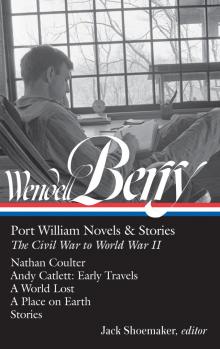 The Selected Poems of Wendell Berry
The Selected Poems of Wendell Berry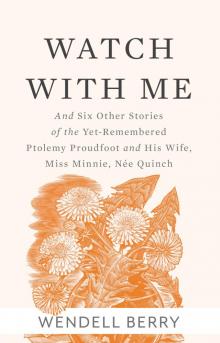 Watch With Me
Watch With Me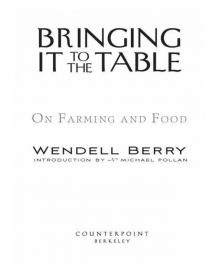 Bringing It to the Table: On Farming and Food
Bringing It to the Table: On Farming and Food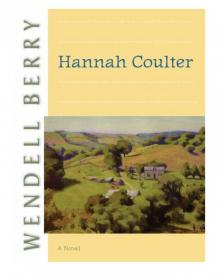 Hannah Coulter
Hannah Coulter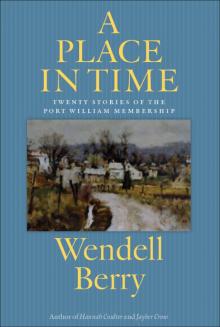 A Place in Time: Twenty Stories of the Port William Membership
A Place in Time: Twenty Stories of the Port William Membership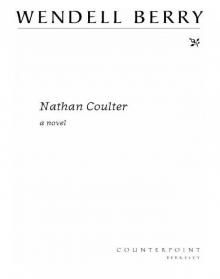 Nathan Coulter
Nathan Coulter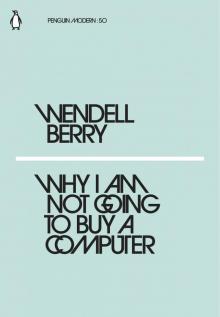 Why I Am Not Going to Buy a Computer
Why I Am Not Going to Buy a Computer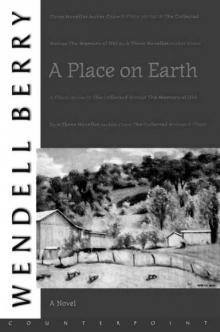 A Place on Earth
A Place on Earth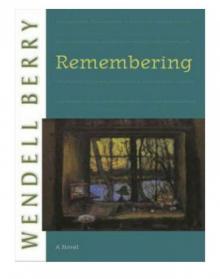 Remembering
Remembering New Collected Poems
New Collected Poems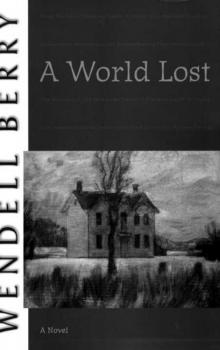 A World Lost
A World Lost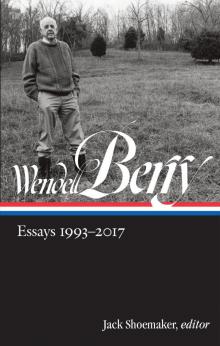 Wendell Berry
Wendell Berry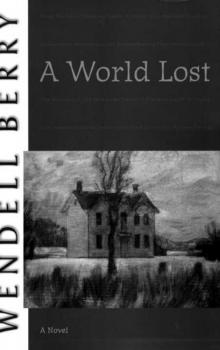 A World Lost: A Novel (Port William)
A World Lost: A Novel (Port William)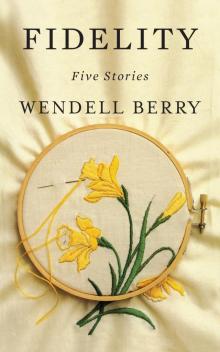 Fidelity
Fidelity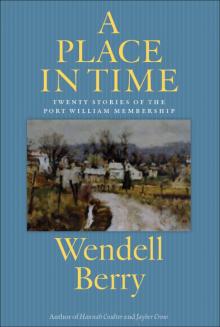 A Place in Time
A Place in Time